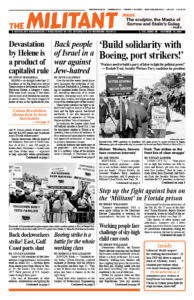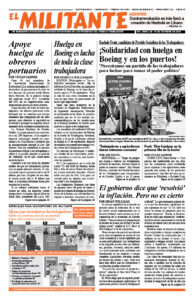Chants of “Union proud, say it loud!” marked the American Postal Workers Union national day of action held in 90 cities across the U.S. Oct. 1.
“The bosses want more productivity out of less people. One person is doing the job of two or three,” Assad Conley, a clerk at the San Bernardino, California, facility for 12 years and vice president of APWU Local 4635, told the Militant. This issue was uppermost for many protesting postal workers around the country. It “puts a lot of stress on workers” and makes “worse wait times for customers,” Conley said.
Other demands include safer working conditions, an end to the divisive two-tier wage system, better work hour guarantees and rights for part-time workers. These are issues that affect millions of working people.
“Any union fight that is successful raises all of us up,” Conley added, referring to other struggles taking place today like the Boeing and longshore workers strikes. “Younger folks don’t accept that conditions are unjust,” Conley, who is 40, said. “So we say this is how you fight it.”
The post offices here are short staffed, but when people retire, they aren’t replaced, Jonathan Smith, the president of the New York area APWU Local 10, told the Militant at their rally on the steps of the main post office. The bosses keep trying to hire more “supplemental” workers at lower wages, he explained.
Azmat Muhammad, has worked as a postal clerk at the Trenton, New Jersey, facility for 10 years. He works “a hard shift, 4 a.m. to 12:30 p.m.,” including every weekend, and his wife works as a substitute teacher so they can juggle taking care of their five-year-old daughter. “Child care is too expensive,” he added.
“Our wages aren’t keeping up with rising prices,” said Syed Hussain, another postal worker at the action in New York. “Without the right to strike, we’re at the mercy of management,” he added. “The last time we went on strike was in 1970. It was effective, now it’s illegal.”
At the Washington D.C., picket, Yvonne Huntley, who is retired after working for 44 years, was part of the 1970 strike. Some 200,000 postal workers nationwide walked out in defiance of government warnings that any strike would be “illegal.” They won wage rises and gained a contract based on collective bargaining. But postal union members are still classified as “essential workers,” barred from striking and forced into binding arbitration.
“Sometimes,” Huntley said, “you have to do what you have to do.”

